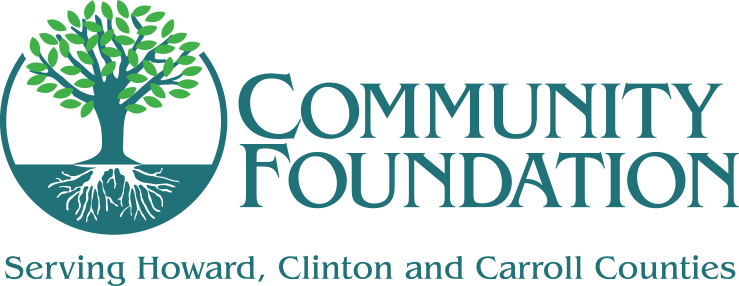
GIVING
Giving FAQs
-
It is a tax-exempt public charitable foundation that provides a way for donors to establish permanent endowment funds or make gifts into existing funds, invests the gifts, and distributes the earnings in the form of grants to charitable organizations. It provides a way for people of all means to make a lasting difference in their community.
-
The Foundation is governed by a volunteer board of directors. They are area residents knowledgeable about community needs chosen to represent the public interest. The Grants Committee and Investment/Finance Committee, also made up of local leaders, make recommendations to the Board. All member positions are voluntary and include a diversity of professional and civic expertise to ensure sound leadership and address the changing needs and challenges in our community.
-
To support your community and the things you care about. The Foundation offers considerable expertise regarding the needs and opportunities within Howard County. This expertise helps people who care about the community find the best way to direct their funds.
Our donors appreciate the speed, flexibility, and ease of using the Foundation. Because the legal tools are already in place and existing forms are available, a fund can be established -and all applicable tax advantages can be obtained - in a very short time.
-
35-1844891
-
Both organizations are important resources. Some have described the differences by suggesting the United Way is more like the community's checkbook, raising and distributing money annually, while the Foundation is more like a savings account, distributing grants from the income of endowment funds forever. The United Way focuses on health and human services, while the Foundation's scope of funding is much broader and includes working in areas such as economic development, education, community betterment, the arts and culture, health, and human services.
While we have different strengths and different core missions, the Community Foundation works closely with the United Way and several United Way agencies. In fact, a number of years ago supporters of the United Way established a designated endowment fund within the Foundation that provides support to the operating budget of the United Way.
-
We manage a large number of endowment funds; therefore, administrative costs for any one fund are minimized - meaning less overhead cost to the donor's fund. Another important advantage is that the federal tax code provides significant incentives for contributions to the Foundation.
-
We offer a variety of options for making donations. By combining your resources with those of others that share your interests, you can maximize the impact of a modest contribution. Gifts of any size make a difference and are always appreciated.
-
Your gift will be acknowledged to the family or honoree.
The name of the individual being memorialized or honored will be added to the Foundation's Book of Memory and/or Tribute Book.
Gifts will be added to the fund of your choice and endowed as a lasting memorial or honorarium benefiting our community forever.
-
There is no cost to set up a fund at the Foundation. The first step is determining what you would like to accomplish and what type of fund you would like to establish. To do this, it may be helpful to learn more about some of our existing funds. Each fund is assessed an annual fee to cover its portion of the administrative expenses at the Foundation. The annual administrative fee is approximately 1% for endowed funds and 2% for non-permanent funds..
-
Donors can recommend a distribution to any charitable organization as long as it has its tax-exempt status - 501(c)(3). If the tax-exempt status of the organization is unclear, Community Foundation staff will contact the organization and request documentation of tax-exempt status.
-
The Community Foundation is legally permitted to grant funds to 501(c)(3) organizations, upon the donor's recommendation, anywhere in the country.
-
Absolutely. Distributions from a fund can be used for tuition for college students or returning adults, or to pay for the costs of private or parochial K-12 education.
Each scholarship fund must contain certain elements. The scholarship program must benefit a broad charitable class of beneficiaries, and the selection process must be nondiscriminatory. You can't set up a scholarship fund to benefit a member of your family, or restrict the eligibility so that only one or two students qualify. Potential recipients may be limited to members of one sex or an economically disadvantaged group.
Another way to establish a scholarship fund is to make the annual income payable to a school, and let school officials select the eventual scholarship recipient.
-
The Community Foundation Serving Howard, Clinton, and Carroll Counties utilizes the Total Return Concept, allowing a fund to benefit from both income and capital appreciation. The present spending policy is 4%, calculated on a past twelve quarter average of the fund's market value determined as of December 31 each year.
-
Yes. The Foundation honors requests for privacy. If a donor wishes to remain anonymous, the Foundation must be notified at the time the gift is made. A request for anonymity means, among other things, that the donor's name will not be published in any public document such as the Community Foundation Newsletter or the Annual Report.
-
Our version of a private foundation for an individual or family is called a Donor Advised Fund. Some of the advantages are:
easier and less expensive to establish (no set-up costs and a minimum of $12,500 to establish a permanent donor advised fund - additional gifts can be made at any time by the founding donor or by others);
charitable gifts to the Community Foundation qualify for a greater tax deduction in most cases;
enhances your easy access to information about non-profits seeking support;
lower administrative costs leaving more to be used for charitable impact;
enables you to make gifts of appreciated assets such as stock options, closely held securities, insurance policies, real estate, etc. with ease and without most IRS limitations;
permits flexibility in timing gifts without an IRS mandated payout schedule;
avoidance of the 2% excise tax on investment income required with private foundations;
Gifts to the fund and grants from the fund can be made anonymously.
-
Beyond taking the initial tax deduction, the donor has no fiduciary, tax or reporting obligations for his or her fund. Tax reporting for all funds at the Community Foundation is included in our single 990 tax form.
-
Yes, through our Legacy Fund program individual donors and/or not-for-profit organizations can grow their fund to the $12,500 level over a period of up to six years. The first payment must be $1,000, and then payments can be made in any amount at any time. If the minimum is not reached in six years, you can direct the assets to another Community Foundation fund or to the unrestricted funds of the Foundation.
